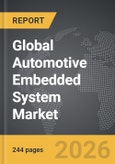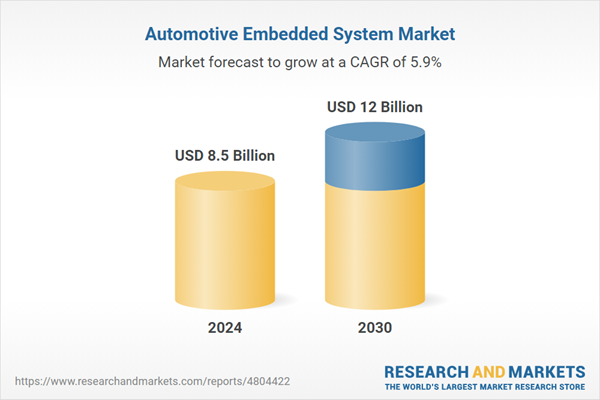Global Automotive Embedded System Market - Key Trends and Drivers Summarized
How Are Automotive Embedded Systems Transforming Vehicle Functionality and Performance?
Automotive embedded systems have become integral to the functionality and performance of modern vehicles, but what exactly are they, and why are they so crucial? Embedded systems are specialized computing systems designed to perform dedicated functions within a larger mechanical or electrical system. In the automotive industry, these systems control everything from engine management and infotainment to advanced driver assistance systems (ADAS) and in-vehicle connectivity. By processing real-time data from various sensors and inputs, automotive embedded systems enable vehicles to perform complex tasks with high efficiency and precision. These systems are responsible for the seamless operation of numerous critical functions, such as controlling fuel injection, managing brake systems, and adjusting suspension settings. As vehicles become more sophisticated, the reliance on embedded systems has grown, making them a cornerstone of modern automotive design and functionality.What Technological Innovations Are Driving the Evolution of Automotive Embedded Systems?
The evolution of automotive embedded systems is closely tied to advancements in technology, but which innovations are at the forefront of this transformation? One of the most significant developments is the increasing integration of artificial intelligence (AI) and machine learning (ML) into embedded systems. These technologies enable vehicles to learn from data and improve their performance over time, particularly in areas such as predictive maintenance, autonomous driving, and real-time traffic management. Additionally, the advent of multi-core processors has dramatically enhanced the processing power of embedded systems, allowing them to handle more complex tasks and operate multiple functions simultaneously without compromising performance. The rise of over-the-air (OTA) updates has also revolutionized the way embedded systems are maintained and updated, enabling manufacturers to deploy software upgrades remotely, which improves system functionality and extends the life of the vehicle. Moreover, the push towards greater connectivity through the Internet of Things (IoT) is further enhancing the role of embedded systems in vehicles, allowing for seamless communication between the vehicle and external networks, thus enabling features like remote diagnostics, fleet management, and vehicle-to-everything (V2X) communication.What Market Dynamics Are Shaping the Demand for Automotive Embedded Systems?
The demand for automotive embedded systems is being shaped by several key market dynamics, reflecting broader trends in the automotive industry. But how are these dynamics influencing the market? The rapid advancement of autonomous driving technology is one of the primary drivers of demand, as these vehicles require highly sophisticated embedded systems to process vast amounts of data and make real-time decisions. The growing consumer demand for connected cars, which offer enhanced safety, convenience, and entertainment features, is also fueling the need for more advanced embedded systems. Additionally, the shift towards electric vehicles (EVs) is significantly impacting the market, as these vehicles rely heavily on embedded systems for battery management, energy optimization, and powertrain control. The increasing regulatory focus on vehicle safety and emissions is another critical factor, driving manufacturers to integrate more advanced embedded systems that can ensure compliance with stringent standards. Furthermore, the rise of shared mobility solutions, such as ride-sharing and car-sharing services, is creating new opportunities for embedded systems to enhance fleet management, vehicle tracking, and user experience.What Are the Key Growth Drivers in the Automotive Embedded System Market?
The growth in the automotive embedded system market is driven by several factors that are reshaping the automotive landscape. The increasing adoption of electric vehicles (EVs) is a major driver, as these vehicles require advanced embedded systems to manage complex powertrain operations and optimize battery usage. The push towards autonomous driving is also driving demand for sophisticated embedded systems capable of processing real-time data from various sensors and making split-second decisions to ensure safety and efficiency. Additionally, the rising consumer expectation for connected and smart vehicles is fueling the integration of IoT-enabled embedded systems that provide enhanced connectivity, remote diagnostics, and personalized user experiences. Regulatory pressures to improve vehicle safety and reduce emissions are further accelerating the adoption of advanced embedded systems, as they play a crucial role in meeting these stringent standards. Finally, the ongoing digital transformation in the automotive industry, characterized by the increasing use of software and electronics, is driving continuous innovation in embedded systems, making them more powerful, versatile, and essential to modern vehicle design.Report Scope
The report analyzes the Automotive Embedded System market, presented in terms of market value (USD). The analysis covers the key segments and geographic regions outlined below.- Segments: Component (Sensors, Microcontrollers, Transceivers, Memory Devices); Application (Safety & Security, Infotainment & Telematics, Body Electronics, Powertrain & Chassis Control).
- Geographic Regions/Countries: World; United States; Canada; Japan; China; Europe (France; Germany; Italy; United Kingdom; and Rest of Europe); Asia-Pacific; Rest of World.
Key Insights:
- Market Growth: Understand the significant growth trajectory of the Sensors Component segment, which is expected to reach US$5.7 Billion by 2030 with a CAGR of 6.4%. The Microcontrollers Component segment is also set to grow at 5.6% CAGR over the analysis period.
- Regional Analysis: Gain insights into the U.S. market, valued at $2.3 Billion in 2024, and China, forecasted to grow at an impressive 5.6% CAGR to reach $1.9 Billion by 2030. Discover growth trends in other key regions, including Japan, Canada, Germany, and the Asia-Pacific.
Why You Should Buy This Report:
- Detailed Market Analysis: Access a thorough analysis of the Global Automotive Embedded System Market, covering all major geographic regions and market segments.
- Competitive Insights: Get an overview of the competitive landscape, including the market presence of major players across different geographies.
- Future Trends and Drivers: Understand the key trends and drivers shaping the future of the Global Automotive Embedded System Market.
- Actionable Insights: Benefit from actionable insights that can help you identify new revenue opportunities and make strategic business decisions.
Key Questions Answered:
- How is the Global Automotive Embedded System Market expected to evolve by 2030?
- What are the main drivers and restraints affecting the market?
- Which market segments will grow the most over the forecast period?
- How will market shares for different regions and segments change by 2030?
- Who are the leading players in the market, and what are their prospects?
Report Features:
- Comprehensive Market Data: Independent analysis of annual sales and market forecasts in US$ Million from 2024 to 2030.
- In-Depth Regional Analysis: Detailed insights into key markets, including the U.S., China, Japan, Canada, Europe, Asia-Pacific, Latin America, Middle East, and Africa.
- Company Profiles: Coverage of players such as Continental AG, Denso Corporation, Harman International Industries, Inc., Johnson Electric Holdings Ltd., Mitsubishi Electric Corporation and more.
- Complimentary Updates: Receive free report updates for one year to keep you informed of the latest market developments.
Some of the 42 companies featured in this Automotive Embedded System market report include:
- Continental AG
- Denso Corporation
- Harman International Industries, Inc.
- Johnson Electric Holdings Ltd.
- Mitsubishi Electric Corporation
- NXP Semiconductors NV
- Panasonic Corporation
- Robert Bosch GmbH
- Texas Instruments, Inc.
- Toshiba Corporation
- Aptiv PLC
This edition integrates the latest global trade and economic shifts into comprehensive market analysis. Key updates include:
- Tariff and Trade Impact: Insights into global tariff negotiations across 180+ countries, with analysis of supply chain turbulence, sourcing disruptions, and geographic realignment. Special focus on 2025 as a pivotal year for trade tensions, including updated perspectives on the Trump-era tariffs.
- Adjusted Forecasts and Analytics: Revised global and regional market forecasts through 2030, incorporating tariff effects, economic uncertainty, and structural changes in globalization. Includes historical analysis from 2015 to 2023.
- Strategic Market Dynamics: Evaluation of revised market prospects, regional outlooks, and key economic indicators such as population and urbanization trends.
- Innovation & Technology Trends: Latest developments in product and process innovation, emerging technologies, and key industry drivers shaping the competitive landscape.
- Competitive Intelligence: Updated global market share estimates for 2025, competitive positioning of major players (Strong/Active/Niche/Trivial), and refined focus on leading global brands and core players.
- Expert Insight & Commentary: Strategic analysis from economists, trade experts, and domain specialists to contextualize market shifts and identify emerging opportunities.
Table of Contents
Companies Mentioned (Partial List)
A selection of companies mentioned in this report includes, but is not limited to:
- Continental AG
- Denso Corporation
- Harman International Industries, Inc.
- Johnson Electric Holdings Ltd.
- Mitsubishi Electric Corporation
- NXP Semiconductors NV
- Panasonic Corporation
- Robert Bosch GmbH
- Texas Instruments, Inc.
- Toshiba Corporation
- Aptiv PLC
Table Information
| Report Attribute | Details |
|---|---|
| No. of Pages | 244 |
| Published | February 2026 |
| Forecast Period | 2024 - 2030 |
| Estimated Market Value ( USD | $ 8.5 Billion |
| Forecasted Market Value ( USD | $ 12 Billion |
| Compound Annual Growth Rate | 5.9% |
| Regions Covered | Global |









